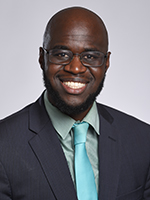First Muslim chaplain welcomed, diversity efforts bolstered
November 2, 2017
Mouhamadou Diagne has only been on campus for about two weeks, but he has already had a positive influence on members of the Muslim community. The University welcomed Diagne, its first Muslim chaplain, Oct. 26 at a reception in South Campus Apartments Building 2, where the chaplain’s office will be located. Faculty, students, and community members came out to support the new chaplain and the Muslim community.
“It’s pretty amazing. I’m just very happy that the opportunity came about; I think it’s a great opportunity for students, and I think for the staff to just really — it opens up a lot of great possibilities, work, education, and literacy,” Diagne said.
“In the few times I have spoken to [Mouhamadou] I can easily tell what an intelligent, kind, and humble person he is. I just love picking his brain and learning from him, and I know we’re gonna have a great time over the next few years,” Osman Vehra ’19, President of the Muslim Students Association (MSA), said.
Originally from Senegal, Diagne came to the United States when he was 12 years old, residing in Chicago and then New York City. He was a Posse Scholar as an undergraduate at Carleton College in Minnesota, where he studied psychology and educational studies in addition to working in the chaplain’s office, where he “definitely found [his] niche within chaplaincy.” He went on to complete a three year masters program in divinity at Harvard, where he focused on Islam, Arab, and African studies. After graduation, Diagne worked as an assistant chaplain for Columbia for two years, which was his most recent position before coming to the University.
Coming from New York City, Diagne was surprised at the swiftness with which he adjusted to the small town life in Lewisburg.
“It’s so similar to Carleton and I kind of missed the small, liberal arts feel. I’m happy to be here, I like how quiet it is, how friendly people are,” Diagne said.
In light of the anti-Muslim rhetoric expressed throughout the 2016 presidential campaign, Diagne was not expecting many Muslim chaplaincy positions to open throughout 2017, so he was pleasantly surprised to learn of the position at the University. What drew Diagne most to the job was the fact that the chaplain’s office would be housed under the Division of Student Affairs, which also includes the Office of Diversity and Inclusion. As a proponent of intersectionality, Diagne appreciated how his office would be on the same par as the office of LGBT Resources and Multicultural Student Services.
Diagne affirmed that he stresses internal and external balance, leading him to do things that line up with his values. From the initial application process to his most recent conversation with Provost Barbara Altmann, he has felt as though he is on the same page as the University.
“The vision and the values I’ve seen here just line up so perfectly with who I am and what I’m about,” Diagne said.
At the reception, Diagne expressed his gratitude for the opportunity to serve the Muslim community, and also his excitement to promote religious literacy and cultural awareness. He aims to transform his office and the existing Muslim prayer space into a “real hub for Muslim life to thrive.”
Diagne wants to implement a series of programs that will help Muslim students further their practice and their connection to Islam through weekly discussions, movie nights, and programs that feature Islamic professors, writers, and scholars. He was also provided with a list of about 20-30 students who identified as Muslim on their applications, and plans on reaching out to each one individually and inviting them to meet with him so he can discover the best way to serve the community’s interests.
Ikmal Azman ’19, Vice President of MSA, affirmed that not every individual on that roster is a culturally practicing Muslim and that the number of active students is actually lower than indicated.
“We don’t have someone to turn to and someone that’s working towards getting more and more Muslims, and by having that chaplain, by having someone talking to admissions, hopefully that will help [increase the number of Muslim students at the University]” Azman said.
In sharing his plan to open up some of the future programs at the University to the entire community, Diagne emphasized that even students who are outside of the Muslim community can gain a better understanding of the Islamic faith and culture.
“I strongly believe when one minority community is served, everybody benefits,” Diagne said.
Vehra also assured the audience at the reception that the MSA would be hosting more events in the coming semesters.






















